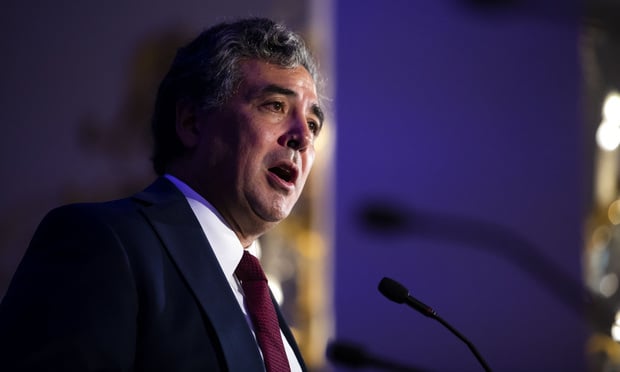EEOC Doesn't Sign Trump DOJ's Supreme Court Brief Against Transgender Employees
The Trump-era Justice Department has been at odds with the EEOC over protections for gay, lesbian and transgender employees.
August 16, 2019 at 05:39 PM
7 minute read
 U.S. Solicitor General Noel Francisco. Photo: Diego M. Radzinschi/NLJ
U.S. Solicitor General Noel Francisco. Photo: Diego M. Radzinschi/NLJ
The Trump administration’s Justice Department on Friday urged the U.S. Supreme Court to rule that a federal civil rights law does not bar discrimination against transgender employees, staking a position against the U.S. Equal Employment Opportunity Commission’s push for broader workplace protections.
The Justice Department’s brief in R.G. and G.R. Harris Funeral Homes v. EEOC was not signed by the EEOC’s general counsel, an indication the agency did not support the submission to the high court. Justice Department briefs filed on behalf of federal agencies in the Supreme Court typically bear the names of counsel for the agency.
“In 1964, the ordinary public meaning of ‘sex’ was biological sex,” U.S. Solicitor General Noel Francisco said in the new filing. “In the particular context of Title VII—legislation originally designed to eliminate employment discrimination against racial and other minorities—it was especially clear that the prohibition on discrimination because of ‘sex’ referred to unequal treatment of men and women in the workplace.”
The new brief was the second time in weeks the Justice Department has lined up against the EEOC at the Supreme Court. The government’s brief in an unrelated bias case backed a national railway company, and the arguments in that case undercut a lower-court victory for the employment agency.
READ: Justice Department’s brief in Harris Funeral Homes v. EEOC
The Supreme Court on Oct. 8 will hear the transgender rights case, one of a trio of cases that confront the scope of Title VII workplace protections for gay, lesbian and transgender employees. The other two cases explore protections for sexual orientation. Federal appeals courts are divided.
Trump’s Justice Department, reversing Obama-era litigation positions, has advanced in lower courts a narrow reading of Title VII protections for LGBT workers, despite opposition from the EEOC, which has argued that the law shields those workers from harassment and discrimination. Messages left with the EEOC general counsel and the agency’s media office were not immediately returned Friday.
The EEOC last year won a unanimous decision from a three-judge panel of the U.S. Court of Appeals for the Sixth Circuit in the agency’s case against Michigan-based R.G. and G.R. Harris Funeral Homes. The American Civil Liberties Union represents the fired worker, Aimee Stephens, who alleged she was dismissed after revealing she intended to transition from male to female.
While the Sixth Circuit appeal was pending, then-U.S. Attorney General Jeff Sessions in October 2017 issued a memorandum reversing the Obama Justice Department position on Title VII and teeing up a clash with the EEOC’s litigation position. The memo stated that “Title VII’s prohibition on sex discrimination encompasses discrimination between men and women but does not encompass discrimination based on gender identity per se, including transgender status.”
The Justice Department’s argument in the brief filed by Francisco in the high court Friday was not a surprise. Francisco had urged the high court in October either to delay reviewing the transgender case pending the outcome of the other two other LGBT discrimination cases at the high court or deny review entirely. He also told the justices that the government disagreed with the Sixth Circuit ruling.
The EEOC currently has a 2-1 Republican majority with two vacancies. Chairwoman Janet Dhillon, at the time of her confirmation, was largely mum about her thinking on the scope of protections for LGBT workers, saying the matter was being litigated. Bloomberg Law reported this week that the Justice Department had pressed the EEOC to join the government’s brief in the Supreme Court.
Stephens, who intervened in the Sixth Circuit appeal, is represented in the high court by John Knight of the American Civil Liberties Union Foundation. Knight’s Supreme Court brief argued that a firing is “because of sex” in circumstances “where but for the employee’s sex, the employee would not have been fired. Sex need not be the sole cause, as long as it is a cause, for the decision.”
Knight also argued, as the Sixth Circuit ruled, that Harris Funeral Homes violated Title VII by firing Stephens because she failed to conform to its sex-based stereotypes about how men and women should identify, appear and behave.
“In the same way that Ann Hopkins was denied partnership because she did not comply with Price Waterhouse’s sex stereotypes about how women should walk, talk, dress, and groom, so too was Ms. Stephens fired for failing to fulfill Harris Homes’s stereotypes about how men and women should appear and behave,” Knight wrote in his brief, referring to the Supreme Court’s 1989 decision in Price Waterhouse v. Hopkins.
 John Bursch addresses the media outside the U.S. Supreme Court in April 2015. Photo: Diego M. Radzinschi/NLJ
John Bursch addresses the media outside the U.S. Supreme Court in April 2015. Photo: Diego M. Radzinschi/NLJHarris Funeral Homes also filed its merits brief Friday. The Michigan business’s counsel, John Bursch of Alliance Defending Freedom, told the justices that Stephens’s view “drastically expands the meaning of sex discrimination and rewrites Title VII to add protected categories that Congress never included, all without advance notice to employers.”
Harris Funeral Homes, Bursch wrote, “would have responded to a female employee who insisted on dressing as a man while working with grieving families the same way it responded to Stephens. Because it does not disfavor one sex compared to the other, Harris does not discriminate based on sex.”
Bursch also said it is not illegal sex stereotyping to apply a sex-specific dress code based on biological sex. “To begin, this court has never construed Title VII as providing an independent cause of action for sex stereotyping. The plurality in Price Waterhouse v. Hopkins, held only that stereotyping could be used as evidence to show ‘disparate treatment of men and women.’”
Francisco was on the Justice Department’s brief with, among other lawyers, Joseph Hunt, the head of the civil division; Eric Dreiband, who leads the civil rights division; Jeffrey Wall, the principal deputy solicitor general; and Hashim Mooppan, a deputy assistant attorney general.
The two other Title VII cases, consolidated for argument, are Altitude Express v. Zarda and Bostock v. Clayton County, Georgia. Those cases ask whether Title VII’s ban on sex discrimination includes discrimination because of sexual orientation.
Read more:
Justice Dept. Disavows EEOC at Supreme Court, Taking Company’s Side
How Stanford’s Pamela Karlan Got SCOTUS Argument Time in LGBT Cases
Record Number of Companies Back LGBT Workplace Rights in SCOTUS Brief
Meet Sharon Gustafson, Trump’s Pick for EEOC General Counsel
Podcast: Why Quinn Emanuel (and Corporate Clients) Are Fighting for LGBT Workers
This content has been archived. It is available through our partners, LexisNexis® and Bloomberg Law.
To view this content, please continue to their sites.
Not a Lexis Subscriber?
Subscribe Now
Not a Bloomberg Law Subscriber?
Subscribe Now
NOT FOR REPRINT
© 2025 ALM Global, LLC, All Rights Reserved. Request academic re-use from www.copyright.com. All other uses, submit a request to [email protected]. For more information visit Asset & Logo Licensing.
You Might Like
View All
Insurance Policies Don’t Cover Home Depot's Data Breach Costs, 6th Circuit Says

'Religious Discrimination'?: 4th Circuit Revives Challenge to Employer Vaccine Mandate
2 minute read
Standing Spat: Split 2nd Circuit Lets Challenge to Pfizer Diversity Program Proceed

Fight Over Amicus-Funding Disclosure Surfaces in Google Play Appeal
Trending Stories
- 1'A Death Sentence for TikTok'?: Litigators and Experts Weigh Impact of Potential Ban on Creators and Data Privacy
- 2Bribery Case Against Former Lt. Gov. Brian Benjamin Is Dropped
- 3‘Extremely Disturbing’: AI Firms Face Class Action by ‘Taskers’ Exposed to Traumatic Content
- 4State Appeals Court Revives BraunHagey Lawsuit Alleging $4.2M Unlawful Wire to China
- 5Invoking Trump, AG Bonta Reminds Lawyers of Duties to Noncitizens in Plea Dealing
Who Got The Work
J. Brugh Lower of Gibbons has entered an appearance for industrial equipment supplier Devco Corporation in a pending trademark infringement lawsuit. The suit, accusing the defendant of selling knock-off Graco products, was filed Dec. 18 in New Jersey District Court by Rivkin Radler on behalf of Graco Inc. and Graco Minnesota. The case, assigned to U.S. District Judge Zahid N. Quraishi, is 3:24-cv-11294, Graco Inc. et al v. Devco Corporation.
Who Got The Work
Rebecca Maller-Stein and Kent A. Yalowitz of Arnold & Porter Kaye Scholer have entered their appearances for Hanaco Venture Capital and its executives, Lior Prosor and David Frankel, in a pending securities lawsuit. The action, filed on Dec. 24 in New York Southern District Court by Zell, Aron & Co. on behalf of Goldeneye Advisors, accuses the defendants of negligently and fraudulently managing the plaintiff's $1 million investment. The case, assigned to U.S. District Judge Vernon S. Broderick, is 1:24-cv-09918, Goldeneye Advisors, LLC v. Hanaco Venture Capital, Ltd. et al.
Who Got The Work
Attorneys from A&O Shearman has stepped in as defense counsel for Toronto-Dominion Bank and other defendants in a pending securities class action. The suit, filed Dec. 11 in New York Southern District Court by Bleichmar Fonti & Auld, accuses the defendants of concealing the bank's 'pervasive' deficiencies in regards to its compliance with the Bank Secrecy Act and the quality of its anti-money laundering controls. The case, assigned to U.S. District Judge Arun Subramanian, is 1:24-cv-09445, Gonzalez v. The Toronto-Dominion Bank et al.
Who Got The Work
Crown Castle International, a Pennsylvania company providing shared communications infrastructure, has turned to Luke D. Wolf of Gordon Rees Scully Mansukhani to fend off a pending breach-of-contract lawsuit. The court action, filed Nov. 25 in Michigan Eastern District Court by Hooper Hathaway PC on behalf of The Town Residences LLC, accuses Crown Castle of failing to transfer approximately $30,000 in utility payments from T-Mobile in breach of a roof-top lease and assignment agreement. The case, assigned to U.S. District Judge Susan K. Declercq, is 2:24-cv-13131, The Town Residences LLC v. T-Mobile US, Inc. et al.
Who Got The Work
Wilfred P. Coronato and Daniel M. Schwartz of McCarter & English have stepped in as defense counsel to Electrolux Home Products Inc. in a pending product liability lawsuit. The court action, filed Nov. 26 in New York Eastern District Court by Poulos Lopiccolo PC and Nagel Rice LLP on behalf of David Stern, alleges that the defendant's refrigerators’ drawers and shelving repeatedly break and fall apart within months after purchase. The case, assigned to U.S. District Judge Joan M. Azrack, is 2:24-cv-08204, Stern v. Electrolux Home Products, Inc.
Featured Firms
Law Offices of Gary Martin Hays & Associates, P.C.
(470) 294-1674
Law Offices of Mark E. Salomone
(857) 444-6468
Smith & Hassler
(713) 739-1250










